Mercury Meltdown PSP Review
Portable consoles and puzzle games go together like the best of friends. A long distance train journey can be made all the more tolerable when you can pull out your miniature friend and start bashing away at some solid puzzler until you find yourself covered in gaming goodness. Sequels and puzzle games don’t go together so well, though. Look at Tetris, Bust-a-groove and Puyo Puyo – all excellent games but with sequels few can remember. Making them differ from the original without changing that core gameplay so much it turns into a different game altogether (see: Tetris Attack) is quite the challenge, and perhaps the reason the original game will always be the landmark title.
The original Mercury was released at the PSP’s launch and was an excellent little puzzler, if a bit rough around the edges. The goal was to manoeuvre a blob of Mercury around mazes of varying degrees of difficulty, all against a strict time limit. Similar to Marble Madness, if your blob slipped off the stage or didn’t make it to the finish in time, it was all over. Unfortunately, a camera only adjustable through four points of the PSP’s D-pad, an unforgiving progression structure and a truly savage difficulty spike made sure that few gamers made it to the end of what was the PSP’s first great puzzler.
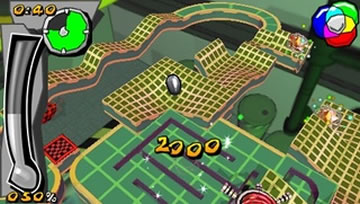
Now that the PSP has been out for some time, and with no ‘launch window’ in which to aim for, Ignition Banbury (formerly Awesome Games) have released Mercury Meltdown, and in doing so have smoothed out those aforementioned rough edges – more levels, streamlined challenges, bonus mini games – creating arguably the PSP’s premier puzzler in the process, subscribing to the “more and better” school of sequel making.
Mercury Meltdown expands on the original by offering you almost twice as many stages to get through and vastly improved the way you do this. At the start of each “lab”, you have access to 16 new mazes and challenges. If you find one too rich for your blood, you simply choose another one. To move on to the next stage you must complete a certain number of them, filling up a meter of Mercury to show your progress. Skilful play can also unlock an ultra-hard 17th stage, some of which will have you crying into your PSP – not because they are unfair – but because you simply aren’t good enough yet.
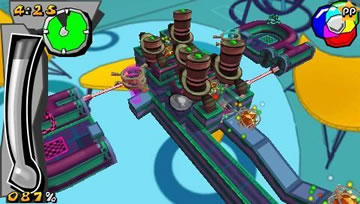
The level design on Meltdown is far superior to that of the original. Some stages will have you sliding the unstable liquid across a thin ledge, whilst some will have you negotiating a series of moving platforms, amongst many others. A simple tap of the select button allows you to view the entire stage at your luxury, instead of having to remember the level overview when you first select the stage. Camera-wise, you are still restricted to four different angles, but there are very few moments where one of these will not give you the optimum viewpoint for a particular puzzle. Once you’ve planned your route, it is all down to you. The analogue nub gives you perfect control over your mercury, so any mistakes are down to your own lack of dexterity, bringing up memories of the excellent Super Monkey Ball.
The difficulty spike that hampered most player’s progress has now become a well judged difficulty curve. Levels can still be finished even after the time limit has expired (although you won’t score the higher scores) and you can finish a stage with even the slightest drop of Mercury left. Sure, this won’t make much of a difference to the mercury meter, but Ignition Banbury have created a very challenging game and removed most of the frustration factor that normally comes with this kind of territory, which is Meltdown’s ace card. No matter how dire the situation looks, with time slipping away and finding yourself far from the goal, completion never seems out of the realms of possibility – so you try again.
And again. And again.
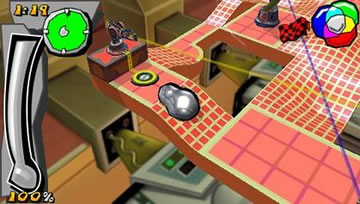
There are a few devious new traps and challenges added to Meltdown’s levels. The main one is that your mercury can be put through a series of different states now, with ‘hot’ turning it into an almost water-like state, ‘cold’ causing it to become a thick, viscous blob and the excellent ‘solid’ state, which turns the mercury into a marble that can roll along rails around the levels. You still have the ability to change the colour of your Mercury, to allow access to the relevant coloured doors. This makes for some ingenious puzzles – some goals are colour coded, sometimes two switches will need to be hit by a split mercury of two different colours and sometimes, you even need to mix colours to create new ones to progress, while a new handy colour mixing guide sits in the top right of the screen as a constant reference.
A point of contention with Meltdown is the new graphic style. Gone are the semi-realistic environments of the original, replaced with a cel-shaded cartoon look, adding a whole new vibrancy to the stages and making the blob of mercury a lot easier to track around the screen. Despite this new style being less realistic, the mercury itself still looks amazing, taking into account its surroundings, lighting and world physics, and if you look closely, even has little blemishes and inconsistencies.
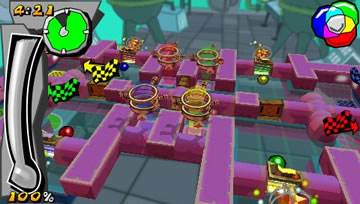
The unlockable mini games are a great addition to the series, acquired by collecting stars scattered throughout the stages some even having potential as games in their own right. Amongst the best are Rodeo, where you must balance your mercury on a platform whilst being blasted by multiple fans and Paint, an excellent little game where you have to cover the surface with more of your colour than your opponents. Admittedly, these aren’t as fun when you are challenging the AI, and the multiplayer mode requires two copies of the game, so I was unable to test this. It is also possible to race through the games various stages against another human player.
The use of the PSP’s Wi-Fi doesn’t stop with multiplayer modes. You can send a downloadable demo of the game to other PSP users and Ignition Banbury have promised some downloadable content in the near future – new mercury skins, levels and possibly even modes.
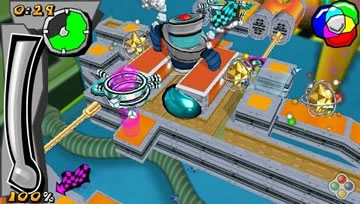
If I had to criticize Mercury Meltdown, it would be that some of the traps are a little irritating. Some levels invert gravity, reversing the controls as you slide around thin platforms and some feature little wandering AI cubes that you need to navigate towards switches to progress. Thing is, it is not like these are in any way bad; they just veer on the more frustrating side of things. It is nitpicking, though, as these things will hardly matter when you start working out shortcuts through the stages and begin clocking up some impressive times and scores.
Ignition Banbury have made that rarity of sequels, improving on every aspect of the original, and also more than doubling the amount of content. If puzzle game sequels were as good as this, no doubt people would be talking about Tetris 2 to this day.
The best puzzler on the PSP? It is certainly a contender.
